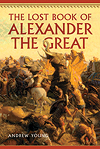
The Lost Book of Alexander the Great, by Andrew Young, Westholme Publishing, Yardley, Pa., 2014, $26
Of all the subjects that have engaged the interest of military historians, few have stimulated more lasting interest than the story of Alexander the Great. A bibliographic search online reveals no fewer than 4,897 books about the Macedonian-born empire builder. What is remarkable is that all this historical writing is based on five sources (Nearchus, Diodorus Siculus, Quintus Curtius Rufus, Plutarch and Arrian), only the first of which was written during Alexander’s lifetime. Other sources available to the ancient historians—notably Alexander histories by Ptolemy and Cleitarchus—have been lost. We know of them only by mention in the surviving works.
The Lost Book of Alexander the Great attempts to re-create the lost history of Ptolemy through what the author calls “literary forensics”—piecing together shreds of information from the other sources, particularly Arrian’s writing, that drew from Ptolemy. This is risky business, Young justifying the effort “because it can be done” and stating as the object of the exercise to obtain “a nearly complete impression of a book that hasn’t been read since ancient times.”
The author fails simply because it cannot be done. It is nonsense to think one can re-create a historical work from fragments cited by others whose own biases guided the selection of those very fragments. This volume lacks a single footnote, and the author’s use of Martin Hammond’s translation of Arrian is unwise. A more widely accepted translation or a work in Greek is required. Finally, nothing in this book tells the reader anything new about Alexander.
—Richard A. Gabriel




